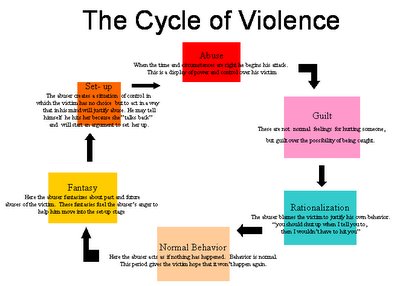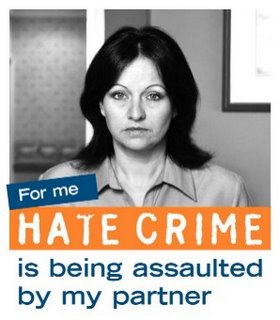A: Nothin', you done told her twice.

There are two types of calls which I am particularly passionate about: mental health consumer calls and domestic violence calls.
Mental illness another time, today the topic is DV.
I've always liked telling women to leave their abusive men. It seldom works but at least it gets them thinking. Victims of domestic violence who end up on the phone with me usually are not thinking all that clearly due to whatever recent indignity to which they have been subjected.
My job is pretty simple: get them help in the form of immediate safety and documentation. Once the information I need for this task has been collected sometimes I get to enter the bonus round. This is where the victim and I just talk.
It usually consists of a little rundown of the living situation: Any kids? Married, living together, or just dating? Family or close friends the victim can stay with? History of the abusive behavior. The basics.
Then the tack I take is always this:
1. If you are not safe in your current situation, you need to go someplace safe.
2. These things usually escalate. No matter how "sorry" the abuser is, it's going to happen again.
3. A restraining order is a great tool with which to arrest the abuser if it is violated later but it will not actually protect a victim. It's just a piece of paper. See rule number 1.

I'm absolutely shameless. I have no problem laying a huge guilt trip on folks. "If not for yourself, then for your kids. Are you going to wait around until one of them gets hurt? Do you want them to grow up without a mother? Did you know children of domestic violence abusers are 20 times more likely to abuse their partners?"
And I almost never get to talk to someone the first time they get hit. Maybe you and your loved one have had some knockdown drag-out fights and maybe you've survived to old age together with great regret. The calls I get are the victim who has been abused mentally longer and more frequently than physically but usually physically several times before ever calling for help.
The worst is when the kids call and the parents are fighting in the background. Your heart just breaks because the kids are usually 6-12 years old and profoundly scared. Their whole world, such that it is, is bad and they know it's not going to change for the better any time soon.
That's the truth too. When the police come it's not going to turn out all happy. One of the parents is usually going to jail. If that's mommy or daddy it's going to hurt, even if they know it's the best thing.
The other parent will often be at the jail later that night to bail them out. That's a tragic truth. Change is hard. Maybe the abuser is the only bread-winner. Many times, as the result in the abusive relationship, the victim doesn’t have any close friends. What else do they know? How are they going to get along by themselves? If they don't bail their abuser out it's only going to be worse when he eventually gets out of jail. It's bound to come up at dinner later.
Getting someone to go to a shelter is the hardest. No one wants to be in a shelter. It's admitting defeat and opening up your private business to complete strangers. It's a tough sell. Yet it does fulfill rule number 1: a safe place.
I'd guess that in ten years and talking to hundreds of domestic violence victims I've only actually made a difference half a dozen times. Maybe less. Yet it's immensely satisfying to have pushed someone in a safe direction, even if they drift back into danger sooner or later.
What I haven’t figured out is how to get more folks to call. Do you have any idea how many gays and lesbians are in physically abusive relationships? Neither do I because they are less likely to call. It seems like there are a disproportionate amount of physically abusive lesbian relationships but I have not done any scientific studies. If one feels oppressed by society one is not likely to call the government to help.
Ditto victims who have very little ability to speak English, victims who come from cultures which are very patriarchal, and victims who are disabled.
And one thing I try to remember and try to impress upon my recruits is that it will only take one bad experience to sour the whole relationship. If a victim calls for help and doesn’t get it, they are not going to call back.
Those victims and their kids are in for a world of hurt.
If you are reading this and are being physically abused, get out. Not "soon" -- now. You didn't ask for it and there are no "good reasons" to abuse someone. No amount of being sorry can fix it and next time it will be worse. Do you want to get killed in front of your kids? Do you? And if you won't do it for yourself or your kids then do it for me; I'm going to worry about you if you are not in a safe place tonight.
I told you I was shameless.
~~
Photos:



10 comments:
No offense intended, but most police officers are not very sympathetic to gay domestic violence issues. (Maybe other areas have better luck...)
Hence why those relationships have a higher abuse rate, and higher rate of unreported offenses. Often times it turns out the victim is already insecure about identity issues, and sneering, chuckling, or just plain rude interactions with public servants don't help.
When I had to file a restraining order against an ex-stalker, I was laughed at by the judge.
(So it isn't just the cops, and I realize most cops are good, dated one....etc).
There simply isn't a level of empathy that most can realize. There isn't enough diverse experiences present or personal experience on the part of the officers or court officials to help to soothe that any time soon.
My personal experience worked out well, although after having to go to court on a violated R.O. (and the judge asking me why I couldn't work it out without the courts being involved) was difficult, it resulted in real Jail Time.
I wouldn't ever go back to that situation.
But not everyone is strong enough to maintain strength in the face of the unknown.
Rather the devil you know, than the devil you don't.
Wow Eric,
This is a great post, one of your best. I'll refer someone I know to it today.
And you've made a difference with, maybe, six? That's terriffic. You're a lifesaver.
Jas - some changes take longer than others. I wish it were not so, but you are right. Everyone down the line has to change. If I can get some bonus time with any couple I feel lucky. Things will get better but you are right about it taking a lot of time. And you nailed the devil thing.
John - I always take your praise as high compliment so thank you again!
I'm not bitter, I'm not even frustrated, rather than be the younger version of me that got angry, instead I got activated.
I became involved, I changed, and I'm stronger for it today.
Everyone reaches a point in life where enough is enough.
The fact that you keep helping is great. You have helped people you don't even know, and that is something to be proud of.
How do you answer a question with a one word:
"DID YOU ALREADY QUIT BEATING YOUR WIFE"
P.S. I'm true gentleman, and therefore never was asked that question.
That's the lovely lie: he was just mad.
I'm not a relationship counsellor. Don't want to be. My job involves only getting the victim away from the abuser. I don't particularly care how it happens, so long that it does.
I don't know how to make relationships better; that's Dr. Phil's scam, er, area of expertise.
There is a lot of shame in domestic violence relationships. The really talented abusers will emotionally cripple the victim until they have no self confidence, no friends, no way out. There's no need for violence in that situation.
The "line" gets further and further away. I'd never let him hit me. Well, I might let him hit me but I'd never let him hit the kids. Well, if I let him hit me then he won't hit the kids again.
Sooner or later someone dies. That fact is not shameless exaggeration; that is the absolute truth.
And men get abused by women too. They have even less support (okay, maybe not less than the gay and lesbian relationships but pretty close).
Native American women are 6 times more likely to be killed by their abuser than other ethnic groups in the United States. White women go to the hospital; Native women go to the morgue.
I wish more people called for help earlier and that there was more power to intervene, yet the government has a poor record of solving social problems. Society has to band together to stop this.
It should never be okay. Not because one is angry or drunk or on drugs or even "defending one's self" against a verbal torrent. If your partner is yelling at you, there is always to option of walking away. That doesn't make you a coward, that makes you safe.
This is a really great post. It will get some people thinking and there many that need to know...
I have mixed feelings about your post. I am glad you wrote about domestic violence, but it sounds very arrogant to me how you are talking to survivors. Survivors have been in these situations and have learned to take care of themselves and need to be EMPOWERED (not made to feel guilty) before they can feel like they have a choice in staying or leaving. You really have the dynamics down pat, you have the education piece, you have all the basics. I just don't see the empathy, compassion, or understanding, which continues to limit the amount of success you get with your calls.
BTW, I am not a survivor-- I am an advocate and supporter who've had much more success using the empowerment model in helping women (and men) make the right choices when it came to their relationships.
Anonymous - thanks for the comment. A lot of what I do depends on tone of voice and method of introduction.
I use a more pleading tone than a commanding tone. I'm just having a conversation at that point. I want the survivor to know that I'm telling them these things because I want them to continue to be survivors. Personal safety trumps short-term happiness (or stability). That itself is a major job.
I'm not a counsellor nor a therapist. My goal is physical separation.
I have minutes to push these folks in a particular direction away from a situation that took years to develop.
I hope that the survivors don't judge me as arrogant but I'll be listening to my tone and delivery with that in mind. I'd hate to offend my callers into not calling back.
Thanks again, you've provided serious food for thought.
Eric,
Great post!! Good job. Keep it up.
In my office, one of the saddest group of clients we see are the women who have left abusive relationship (with traumatized children in tow)....only to almost immediately begin another relationship with yet another abuser. We see this over and over again....through the children's eyes mostly....and it crosses all the demographics....gays, straight, caucasin, black, native, asian. For those kids it is yet another major trauma in their lives. And what does it do to their life view..."when things get real scarry Mom leaves and a week later here we are in another situation scarier than the last".
You are also right that it is really hard for people in Los Anchorage who can't speak English to get the help they need.
We, too, are constantly encouraging people to get restraining orders (which are very easy to get initially, by the way)but they are all too often not enforced (half the time because the victim doesn't report the violation).
The answer???...Just keep tyring,talk,empower when you can,lecture,plead. And do I use the children as a weapon in my verbal exchange with some of the people who call me........absolutely. Is that abuse? But one thing we hear a lot is "he's never ever hurt the children...or I would leave"..well, bull...if he/she hits or verbally abuses Mom/Dad that DOES hurt the children. And it sends really bad messages to kids about respect and reponsiblilty.
In my office....most often it is the children that we see - suffering the fall out,not just at the time,but for years and years.
I am really proud of both you and Jas.
Good people caring and taking an active part....helps enormously.
Post a Comment